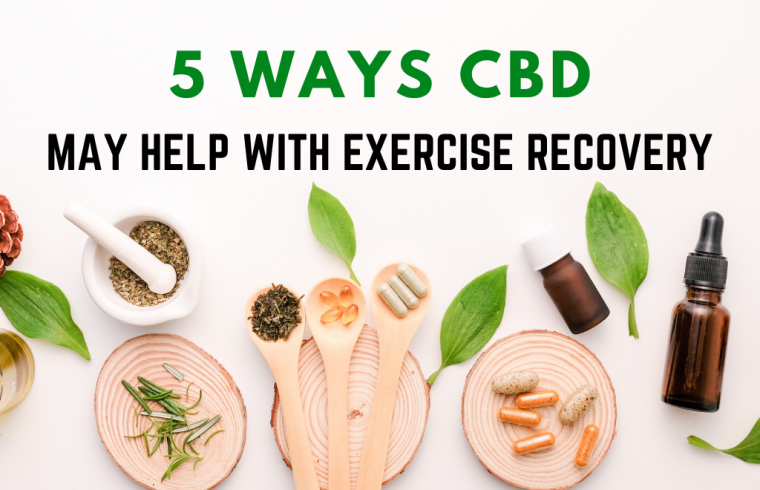
Did you know that CBD may help with exercise recovery? It’s true! Cannabidiol use is becoming more expansive. From initially helping relieve pain and reducing the unfavorable effects of chemotherapy, several wellness and cosmetic products now carry with them ingredients derived from cannabidiol.
More popularly known as CBD, cannabidiol is, perhaps, most well-known in its runny, liquid oil form. Cannabidiol is simply a cannabis or marijuana extract that’s marketed in the form of edibles, capsules, crystals, waxes, and topical creams.

Marijuana plant, also known scientifically as Cannabis sativa, contains significant amounts of tetrahydrocannabinol (THC), which is classified as a psychoactive compound. On the other hand, industrial hemp is high in CBD, but not THC.
Unlike THC, cannabidiol isn’t addictive, making more countries open to using CBD for medicinal purposes.
While known for alleviating pain more than anything else, there’s an increasing number of fitness enthusiasts who swear by CBD’s efficacy on their physical and mental wellbeing. Anecdotal evidence suggests that CBD use may help aid in muscle recovery and promote athletic performance.
Here’s how CBD may help with exercise recovery:
1. CBD May Reduce Inflammation
Inflammation is your body’s way of reacting to what it perceives as a perilous stimulus. When you work out, your body becomes inflamed because of the intense muscle and weight pushing, pulling, and stretching. This triggers the muscles to tear and cells to break apart. Inflammation comes in as the first stage of your body’s healing process. You’ll feel sore and painful all over as the body increases blood flow, regenerates the muscles, and removes toxins formed during the various muscle stresses and activities.

Few researches claimed CBD may have high anti-inflammatory properties. In fact, it has shown efficacy in small tests involving rats with joint inflammation and dogs with osteoarthritis. The best part? There were no significant side effects noted.
CBD is said to be effective in reducing inflammation and pain post-workout. And, because chronic inflammation is blamed for the progressive conditions of specific serious diseases, such as diabetes, Alzheimer’s disease, multiple sclerosis, dementia, and cancer, CBD use may be effective in easing their symptoms, too.
2. CBD May Assist in Muscle Recovery
When you push your body too far, your body’s normal processes are disrupted, leading to minute muscle breaks or tears. As CBD is believed to have anti-inflammatory properties, it may reduce overall problems with the body after a vigorous exercise.
There’s no available study fully explaining the mechanics of how CBD interacts with the human body to help speed up muscle recovery. However, less pain, inflammation, and injury risks mean that your body can swiftly recover from the pain and soreness, allowing you to continue with your heavy exercise routines daily. With CBD edibles, creams, and oils readily available in any online CBD store, you may no longer need to skip your pushups and sit-ups for a couple of days to recover from the excruciating pain.
3. CBD May Be an Effective Post-Exercise Painkiller
Athletes are prone to nociceptive pain, which occurs when nerve fibers are triggered by inflammation due to rigorous physical activities or physical trauma, such as accidental injuries. This means nociceptive pain reacts to a specific stimulus, whether internal or external.

On the other hand, there’s neuropathic pain, which happens when the nervous system is affected or is malfunctioning because of a disease or an injury. Also called nerve pain, neuropathic pain is typically chronic. Patients suffering from cancer, stroke, amputation, diabetes, and multiple sclerosis often feel neuropathic pain.
Research on CBD show encouraging results in terms of reducing inflammation and minimizing both nociceptive and neuropathic pain. The National Centers for Complementary and Integrative Health (NCCIH) says CBD may be may be effective in managing chronic pain, although more research has yet to be done to establish its efficacy and safety.
The US Food and Drug Administration has yet to approve CBD use for exclusively treating pain. In Canada—one of the few countries in the world to have legalized cannabis use—a 1:1 ratio of CBD and THC for the treatment of pain has been approved. This type of pain may either be caused by multiple sclerosis or certain types of cancer that can’t be addressed by opioid-based pain relievers.
Hence, those who exercise often may find it useful so that they can push their physical boundaries to the limits while not worrying too much on the ensuing pain.

4. CBD Promotes Better Sleep
Being able to sleep soundly at night brings a host of benefits to your body. Aside from enhancing your immune system, a restful sleep can also improve mental acuity and physical performance.
CBD is believed to be responsible for slowing down the reabsorption of adenosine triphosphate (ATP), the main source for fueling and storing energy at cellular levels.
As neurons that bind to adenosine hinder the release of neurotransmitters, it also slows down the brain processes, enhancing a feeling of calmness, which later helps you sleep faster. Additionally, CBD’s perceived anti-anxiety properties may help promote a better slumber.
5. CBD May Improve Athletic Performance
In 2018, the World Anti-Doping Agency (WADA) removed cannabidiol from the list of prohibited substances for athletes. The US Anti-Doping Agency followed suit, paving the way for the regulated use of CBD among sports players. Unfortunately, THC, being a psychoactive compound, isn’t off the hook.

Because of its perceived benefits in managing pain, controlling inflammation, accelerating muscle recovery, among other advantages, CBD use is gaining ground. However, there’s no conclusive data to back up claims of overall improved athletic performance among athletes and sports players.
The Bottom-line
Gym buffs and athletes may be able to benefit from the promising benefits of CBD for overall improved performance and faster healing. As with other supplements, however, you may need to consult with your healthcare professional before trying it out, especially if you have certain health conditions or are taking medications.
In addition, results vary from one person to another, which means it may work with optimal results to some, while others may not experience any improvement. Worse, others may be at risk of suffering from potential harmful side effects. Except for fatigue, appetite changes, and diarrhea, there have been no major issues reported due to CBD use thus far.












